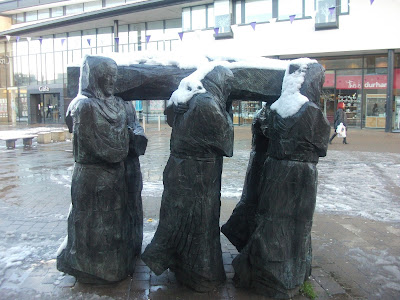It is no wonder that so many women have taken up writing over the centuries. It is the perfect form of work for them, you can write anywhere, at home surrounded by your hopefully increasingly dusty house, in cafes and even watching television with your children. You don't even have to write as such, you can just sit there and think about your work everywhere you go.

Heathwaite, where Elizabeth came to live with her aunt when she was a year old
I was in Knutsford at the weekend. One of the gems of Chesire and immortalised by television as being the original model for Cranford though of course the filming was elsewhere. Parts of Knutsford have changed since Mrs Gaskell wrote about it but the two main streets, King Street and above it Princess Street remain much the same, I think and many of the buildings which she knew are still intact.
She was born Elizabeth Cleghorn Stevenson in 1810 in Chelsea but her mother died shortly afterwards and she went to live with her aunt, Hannah Lumb in Heathwaite, the lovely house which overlooks the heath. It may seem cruel to us now that her father sent her off to live in Chesire when she was a year old. He married again and had other children and it could be several years before Elizabeth saw him.

Dr Holland's house
She went to school in Warwickshire but it was in Chesire that she met William Gaskell who was junior minister of Cross Street Chapel in Manchester. They were married at the parish church in Knutsford and after their marriage they lived in Manchester but Elizabeth was often at Knutsford, she was very fond of her aunt and referred to her as 'my more than mother'.
Elizabeth was a Unitarian and she and her husband taught in Manchester. Her family did great charity work during the cotton famine caused by the American Civil War. Unitarianism, the religion of Elizabeth's family, was way ahead of its time, teaching tolerance towards all people no matter what their religion. Her husband, who had his own literary career, taught the poor and held welfare committees, and many of their friends were social reformers and religious dissenters.
They had several children but Elizabeth only started to write, encouraged by her husband, after the death of her baby son.
She wrote Mary Barton which was about the poor and disadvantaged in Manchester. It was regarded as subversive by many because people assumed that the hardships the poor endured were their own fault due to their thriftlessness and vice, a view which some people still believe today. ( Ecclesiastes: There is nothing new under the sun. )
Worse was to follow. Elizabeth wrote Ruth, a novel about an unmarried mother. I think what I like most about Gaskell's work is that she takes on subjects which other people were afraid to write of. It was said that even some of William's congregation burned the book. She was indeed a very brave woman.
The building on Princess Street supposed to have been used as Miss Matty's house in the stories.

Brook Street chapel in Knutsford where Elizabeth, her husband, William and two of their daughters are buried.

Typical Knutsford, beautiful old houses
Her best known work of course is Cranford but I prefer North and South where Margaret Hale comes north with her family and discovers what the world is like which centres around a cotton mill.
Women are so important in her novels. Interestingly too she was fond of using dialect. If you can make dialect comprehensible to people from other places I think it can stamp your stories as products of where they came from but enable everyone to enjoy them.
Mrs Gaskell is also known for the biography which she wrote of Charlotte Bronte. Apparently she visited the house in Manchester three times and once hid behind the living room curtains because she was shy with visitors. Mrs Gaskell wrote ghost stories. Charles Dickens helped her with these and published her work in his magazine, Household Words.
I was pleased too to note that Elizabeth Gaskell spent time in Newcastle upon Tyne with Rev. William Turner's family and in Edinburgh. Born in London she may have been but I like to claim her as a real northern writer and true northern woman.
 These are our very own monks, carrying Cuthbert's body. They're in Millenium Square right outside the library. There again, perhaps Palace Green would have been more appropriate, they're not even going the right way! Very useful though for beer bottles on a Saturday night.
These are our very own monks, carrying Cuthbert's body. They're in Millenium Square right outside the library. There again, perhaps Palace Green would have been more appropriate, they're not even going the right way! Very useful though for beer bottles on a Saturday night.

















